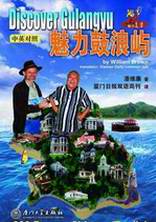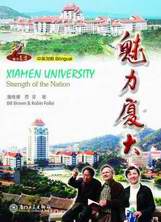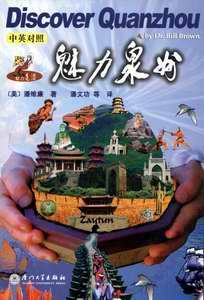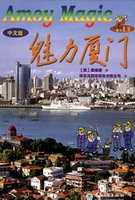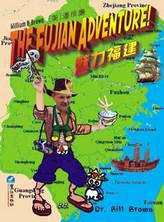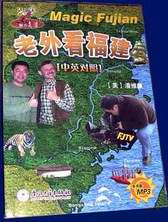![]() Click
to
Access
Click
to
Access
AMOY MAGIC SITE from
OUTSIDE China
![]() Click
to Access Amoy
Magic Site from
Click
to Access Amoy
Magic Site from
INSIDE
China ![]()
TRAVEL LINKS
![]() Xiamen
Xiamen
![]() Gulangyu
Gulangyu
![]() Jimei
Jimei
![]() Tong'an
Tong'an
![]() Jinmen
Jinmen
![]() Zhangzhou
Zhangzhou
![]() Quanzhou
Quanzhou
![]() Wuyi
Wuyi
![]() #1Fujian
Sites!
#1Fujian
Sites!
![]() Fujian
Foto Album
Fujian
Foto Album
![]() Books
on Fujian
Books
on Fujian
![]() Readers'Letters
Readers'Letters
![]() Ningde
Ningde
![]() Zhouning
Zhouning
![]() Longyan
Longyan
![]() Sanming
Sanming
![]() Putian
Putian
![]() Bridges
Bridges
![]() Travel
Info,
Travel
Info,
![]() Hakka
Roundhouses
Hakka
Roundhouses
![]() Travel
Agents
Travel
Agents
MISC. LINKS
![]() Amoy
People!
Amoy
People! ![]()
![]() Darwin
Driving
Darwin
Driving ![]()
![]() Amoy
Tigers
Amoy
Tigers
![]() Chinese
Inventions
Chinese
Inventions
![]() Tibet
in 80 Days
Tibet
in 80 Days![]()
![]() Amoy
Vampires!
Amoy
Vampires!
![]() Dethroned!
Dethroned!
![]()
![]() Misc.Writings
Misc.Writings
![]() Latest
News
Latest
News
![]() Lord
of Opium
Lord
of Opium
![]() Back
to Main Page
Back
to Main Page
![]() Order
Books
Order
Books![]() Xiamenguide
Forum
Xiamenguide
Forum 
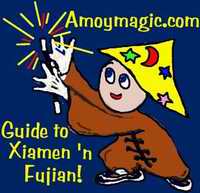
By Walter deVelder
.... This
fascinating memoir was provided by Joann
Hill. Enjoy!
![]() Part
1: 1900-1910
Part
1: 1900-1910 ![]() Part
2: 1910-1920
Part
2: 1910-1920 ![]() Part
3: 1920-1930
Part
3: 1920-1930
![]() Part
4: 1930-1940
Part
4: 1930-1940 ![]() Part
5: 1940-1950
Part
5: 1940-1950 ![]() Part
6: 1950-1960
Part
6: 1950-1960
![]() Part
7: 1960-1970
Part
7: 1960-1970 ![]() Part
8: 1970-1980
Part
8: 1970-1980
![]() Return
to The Amoy Mission
Return
to The Amoy Mission ![]() I
Remember "Wally"
I
Remember "Wally"
Part 7: 1960-1970
In the late 1950s and early 1960s the RCA had the following missionary personnel in Hong Kong ¨C Bessie Bruce for two years pre-retirement in women's work, Al and Gerry Poppen for two years in language study before going to a one term assignment in Taiwan, and Gordon and Gladys DePrco, 1959-1962, when Gordon was Director for "R & R" for visiting Navy servicemen at Fenwick Pier, and Adeline Syberma a teacher in the Amoy College, 1955-1961.
Fenwick Pier gave me the status of honorary Chaplain for several years and sent me to preach on Navy ships in the Harbor as need arose. One of the great stimulants in Hong Kong was the bimonthly clergy retreat at Bishop House, where Bishop R. D. Hall was the Chairman of the group. R. D. Hall was a fantastic leader on many fronts. During the Second World War - the China War lasted eight years ¨C the Bishop's huge Diocese in South China was in great need of Priests and Pastors ¨C Bishop Hall ordained two Chinese women Preachers and he was censured by the Anglican Church. The biography of R. O. Hall, Bishop of Hong Kong is great reading.
In the early 60s the Hong Kong government built a huge Rehabilitation Center in Kun Tong, Kowloon. The man who opened the facility was Douglas Boder from England. I had heard of him because a book had been written about him. His story was also made into a movie called "Reach for the Sky". Boder in 1939 was a daring flyer in the RAF ¨C Royal Air Force ¨C he had lost his left leg in a plane accident but when war broke out he was a group Captain in spite of his wooden leg. In later 1943 he was shot down over the Channel and crashed his plane in England, losing his right leg. With stamina and resolute determination he proved to be a great leader to the handicapped. In the 50s he was sent to the US to visit the handicapped in our rehabilitation centers. On one occasion he visited a US Army Colonel who had lost a leg and was very depressed in a hospital. After some talk from Boder, the Colonel with some anger and frustration said, "what are you talking about, you haven't lost a leg as I did". Captain Boder said, to him gently, "feel my legs, I lost both". This melted the Colonel's heart and he became a strong advocate for rehabilitation.
We had all sorts of wonderful experiences in Hong Kong. We could listen to some of the world's great artists, and see them perform at the newly opened Civic Auditorium.
In 1961 our family of six was cut down to three, Margaret, Dirck and John left Hong Kong for the US to attend Hope College. Margaret to be a sophomore after a year at Hong Kong U. and our sons as freshmen. This was a great wrench when three of our lively teenagers left the nest at tone time. Dave was still with us and we took in a little Chinese orphan girl who had been adopted by a family in Vermont. Little Rose, so named by the orphanage, had been picked up at the Kowloon Railway Station and was probably about two years old when adopted. She was to be with us for a month, but stayed for ten months because of a snafu in the Orphan Act. Her name is now Anne Thayer Cohen, a graduate of Rensalaer Polytech Institute in Troy, and married with three small sons of their own. When she left us we had become very much attached to her and she to us.
The Amoy Happy Valley Church started a branch Chapel in North Point. We started on a verandah and then bought two flats. We tore out one wall and this gave space to seat about one hundred people. I was happy that James Su, Elder in Happy Valley Church was elected President of the Hong Kong Council of the Church of Christ in China, a position he held for several years. It was sad that the Kowloon Amoy Church would not join because the Pastor was very conservative. Many refugees came to Hong Kong from the mainland every day. In 1960 China drove the Russians out of the China picture and that made it more difficult for Hong Kong.
In 1959 and 1960 I made three trips out of Hong Kong to Manila for a Youth Conference, to two Church Conferences in Taiwan and Singapore. I was home only a week at a time and that was less time than the often three weeks I made into the countryside when we worked in the China mainland.
In 1963 we were due for a furlough. The time of service on the field was changed from seven years to five. But we had a bit of a problem. Phil and Margaret would be graduating from Hope College in May, but David would not finish the school year at King George V until mid June. Harriet went on to the States by freighter in April, and David and I went by air in June. We lived in a Mission home across the street from Dimnent Chapel. Dave worked at maintenance at the Hope College campus for the Summer. We had a new Ford station wagon from R. E. Barber again and covered many miles on Deputation.
In the Fall Dave entered the Senior class at Holland High School as he lacked a credit in US History for College. We were a very busy family. In September Dirck and John went into the Junior year at Hope College. Phil went for an MA in Kalamazoo, commuting with a friend and Margaret went for an MA to Ann Arbor, coming home for weekends. The children had many friends coming in and Harriet and I often slept in the attic, which was always nice and warm. We took in all the college activities we could and enjoyed them.
The Hong Kong Council asked me if I could return early and I returned to the Big City and territory in mid-January, 1964. Before I left, Hope College honored me with a granting of an Honorary DD ¨C Doctor of Divinity. Harriet stayed in Holland, waiting to see David into college in Autumn.
I stayed in the English speaking YMCA in Kowloon. When Harriet returned to Hong Kong we moved to Suffolk Road in Kowloon Tong, and took in Donald and David Landsborough, twin sons of Drs. David and Jean Landsborough in Taiwan. Donald and David entered KGJ School. There was no British system school in Taiwan for the boys. We had the twins with us for six academic years and their sister, Katherine, for one year, and so with teenagers in the home, we were kept young in spirit. We loved and enjoyed them.
In 1964 Hong Kong experienced some troubles. The Communists tried to instigate riots, but the 10,000 Chinese Police Force stood firm, and peace was maintained. This showed tremendous loyalty on the part of the Chinese Police Force. At one time we were kept in the house for the better part of three days, and were let out only once to buy bread and other supplies.
In the Summer of 1965 I went to the US at our own expense to see Dirck and John graduate, and to attend Margaret's wedding. The American President Line offered a most unusual fare for the passengers in steerage class for $75.00, and Greyhound Bus Lines in the States had a "99 day $99.00" ride anywhere in the US. It was good to be at Dirck and John's graduation service and I could walk down the aisle to give our dear daughter away to Edward Hougen. Edward's mother is Mildred Dulmas Hougen, who was in the class of 1929, the class I was in also.
I returned to the Far East by plane via Taiwan to represent there the RCA at the 100th anniversary of the English Presbyterian Mission in Taiwan. This was a wonderful celebration in a large open field in Hua-lian. We saw five hundred girls from the Ami tribe in the mountains in beautiful costume perform some of the ancient agricultural dances. I was honored to preach in one of the large Taiwanese Churches. The Presbyterian Church in 1955 had made a plan to try to double the church membership by the anniversary year in 1965, and had obtained that goal. It was a thrill to be part of this time of outpouring of thanksgiving to God.
In 1966 the dreaded Cultural Revolution began in the mainland and was to last for ten horrid years. We heard dreadful tales about our dear friends in Fukien. Hong Kong was affected but the Chinese Police Force stood whenever any trouble arose and we were safe. Hong Kong remained a haven of peace. Vietnam was an inferno of war, and Taiwan was often in peril.
I was one of the delegates on the Hong Kong Council team to go to Singapore to learn what kept Singapore and environs clean. Singapore was an example to the world and Hong Kong wanted to learn from them there. Singapore had a fine government and its people were proud of the place.
In 1967 we were given a six month furlough. We left Hong Kong in April
on a freighter direct to Los Angeles in sixteen days. Jean Walvoord was
also with us as one of the twelve passengers. A Missionary mother and
her daughter from Canton were also enroute to California. The daughter,
about thirty five, was quite handicapped and needed help in walking. Jeane
and Harriet spent much time helping her walk in the small deck space.
She would quote from memory many of the beautiful Psalms, but one of her
favorite sentences was, "The Lord teaches my hands to war and my
fingers to fight". We all thought this was not one of the most beautiful
quotes from the Psalms. We did a lot of reading on this trip. The ocean
was calm every day. It was fun to watch the big sea gulls follow the ship
especially after meals and to see them play games on the masts and rigging.
We entered the US at Los Angeles. I had very powerful field glasses and
could see the coast line clearly. There had been some very heavy rainfall
and we could see beautiful houses which had gone into the ravines because
of landslides. We were happy to arrive after a pleasant trip.
Dr. & Mrs. Edward Hougen met us at the gangplank, father and mother of our sone-in-law Edward, who had married our daughter Margaret in 1965. They lived in North Ridge, California about forty miles North of L. A. Airport. We had two delightful days with them and then flew up to San Francisco where we stayed two days with Dr. Ed Strick in Palo Alto. We bought a small Fiat sedan and started East after I had preached in the Church at the Church of the chimes in San Jose, CA. Our little Fiat was a gem. We bought it from Missionary outlet, an international organization which sold certain cars, refrigerators, generators and all kinds of merchandise to missionaries at substantial discount.
We got the car on Saturday in Los Gatos and as I said earlier we went East via San Jose from Palo Alto. On Sunday morning early we were on our way to San Jose from Palo Alto travelling forty miles an hour on the super highway. There was no traffic and suddenly a State Trooper came from behind and flashed us to stop. The big State Trooper with the name of Captain Hoogenberg said to me, "Do you know at what speed you are going?" I answered, "forty miles an hour". Then he said "why are you going so slowly?" I replied "I have three reasons, I bought this care yesterday, I have just returned from Hong Kong five days ago, and wish to be cautious, and I have plenty of time to get to my preaching assignment in San Jose". He asked, "are you a preacher?" My answer was "I am a Missionary of the Reformed Church in America, and have been in the Far East for more than thirty five years". The State Trooper told me to use side roads, or he suggested I drive more than forty five miles an hour on the super highway because he said, there were many State Troopers who were as eager to give tickets to slow going cars as to those who broke the speed limit. Harriet and I realized we were back in the "fast track" in the USA. Our little Fiat behaved most efficiently on our way East.
We arrived in Lawrence, Kansas on the third evening and were warmly welcomed by Dirck and Marielle, who were studying for their Masters' degrees at the University of Kansas. Dirck in teaching English as a foreign, or second language, and Marielle in French. Marielle found this very easy and did teaching on the side to keep the budget in the black. While in Lawrence we took Dirck and Marielle on two delightful side trips, one to Emporia, Kansas, to visit my cousin John and Ruth Breukelman, and another to Riley, Kansas to see Dr. & Mrs. Ted Oltman. Cousin John in Emporia was head of the Biology Department in the University and had been honored by having a very large building for research named in his honor. Ted Oltman was the last RCA Missionary out of China. He was asked to go to the Philippines as a medical Missionary but asked to go to an isolated region in Kansas where the hospital was thirty miles from Riley, a small village many miles from Fort Riley. It was good to see these dear relatives and friends again. Dirck and Marielle were busy in their studies and teaching and we left them in the hope that we would see them at Christmas time in Holland, Michigan.
The little Fiat took us to South Dakota and Iowa, where we were happy to introduce Marielle and where Dirck had not been for many years. In Iowa we stayed with our niece, Marge Kleinwolterink and her husband, Al. One day I wanted to show Marielle where I was born on a farm two miles west and a half-mile South of the Village of Boyden, Iowa. As we approached the place, I realized that the farm was not occupied. From a distance I could see that the farm buildings looked dilapidated and needed paint. As we drove into the yard I was sorry to see that it was full of weeds and looked most untidy. The back porch of the house was falling off and the shutters hung down and were broken. It was altogether a very sorry sight and it was embarrassing to show my birth place to the children. Some years later, Harriet and I went past the farm again and saw that the farm buildings were repaired and painted and things looked different. We saw that the house was occupied. We drove into the yard and found it all tidy with flowers in bloom. the place had been restored to its early appearance. The young farmer and his wife were courteous and friendly. We took pictures and sent them to France. At Christmas time that year we received a full blown picture of the farm where I was born in 1907 and it looked beautiful. The picture is now hanging in a prominent place in our living room.
Now, we did part from Dirck and Marielle, no more persuasion to go on side trips worked. On our last lap of the journey from Iowa to Michigan we stopped over night at our nephew and niece's home in Davenport, Iowa, Bud (Donald Foreman) was supervisor of shop in the Quadcity Schools and Greta taught Special Education.
It was November, and as we rounded Chicago, we felt it getting colder and as we neared Lake Michigan the temperature dropped to 35 degrees. As we neared Saugatuck, the little Fiat coughed and sputtered and as we drove into a gas station the little car stopped altogether. We called AAA of which fortunately I was a member, and suffered the humiliation of being towed into Holland. At the garage in Holland, which had the Fiat dealership, the mechanic said, "what I think this Fiat needs is a drink of heat", I had never heard of such a thing. He poured a can of liquid into the tank, put a little in the carburetor and the Fiat began to purr as a contented kitten might. It was amazing and we drove to our home on West 22nd Street, a new Missionary house, recently given to the Board of World Mission of the RCA.
All the children came to us for a few days in the holidays. Dave was in his Senior year at Hope College. I was kept very busy in Deputation work and had no trouble with the Fiat now that we knew she needed a can of heat, when the temperature dropped to 32 degrees. Graduation for Dave came in early June. Sister Tene and her husband William (Bill) Bomgaars came from Sioux City, Iowa for the festivities. David became engaged to Linnia Fransen and we celebrated the occasions and Dave's graduation with a lovely party in Saugatuck.
At the second of
June we started back to Hong Kong and drove the Fiat to San Francisco
via Iowa, South Dakota and the Grand Canyon. We sold the care back to
the Missionary Outlet in San Jose for almost the same price we had paid
for it. All in all this was an excellent deal because with thousands of
deputation miles on it at ten cents a mile, we did not lose any money,
but in fact gained some. We were sorry to give up this little sedan. She
ran well and the window curves and so on made her a delight to drive.
Our freighter ship took us on a smooth trip to Hong Kong. We had a delightful
two days with our dear friends, Bernard and Ashtral Hormann. In Hong Kong
we moved to a new flat on Suffolk Road in Kowloon Tong. It was a very
cozy place in the rear of a large Chinese house. Our boys, Donald and
David Landsbowy, came to us again in September from Taiwan. During our
stay in the US they had lived with another family while attending KGU
School.
In October the Communists tried another bit of mischief in Hong Kong and once again the Chinese Police Force thwarted their intention. We were pleasantly surprised that our landlord, although neo-Communist insisted that I park our car on the compound for two nights.
In February 1969 I made a very interesting trip to Singapore as a member of a delegation from the Hong Kong Council. We were interested to see why that city could keep its environs so clean and tidy. We were to bring back recommendations as to how Hong Kong could make itself a cleaner place. Bishop Hall retired and Gilbert Baker was chosen the new Bishop. The new facility at Fenwick Pier filled a great need, and I was given the position of honorary Chaplain in all of its activities.
Our Branch Church in North Point, an off-shoot of the Happy Valley Church was doing well and we also, started work in Aberdeen on the back side of Hong Kong Island. James Su, Elder in the Happy Valley Church, and a prominent member of the Education Department of the Government was elected President of the Church of Christ in China Hong Kong Council and held that eminent position for several years.
1969 was a banner year for us in Hong Kong. the BWM of the Reformed Church in America assigned our son Dirck to a special project in Hong Kong for two years, teaching English as a second language. Grandson Marc was six months old. His little blonde head attracted much attention. Harriet and I lived in Won Chai in Hong Kong Island. Dirck and Marielle and Marc found a flat in Stanley Bay. Dirck taught at Kung Lee High School near Tiger Balm Garden. Marielle did some teaching at Alliance Francaise. In 1970 Dirck and Marielle and Baby Marc had a holiday in Taiwan, and when we met them on their return Marc out at the airport to greet us, the first time we had seen him walk. We were surprised and he was happily proud!
Dirck taught English.
He would some times come across to the Council office and we would have
a good meal of curry rice at Cherikoff's Restaurant also on Prince Edward
Road, Kowloon. This fine eating place was run by White Russians. In our
seventeen years in Hong Kong Church World Service we helped more than
10,000 White Russians, deported from their homes in Russia to emigrate
to many countries in the world. We were very sorry for these unfortunate
refugees.
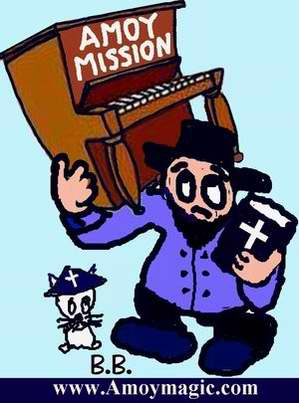
E-mail: amoybill@gmail.com
Snail Mail: Dr. William Brown
Box 1288 Xiamen University, Xiamen, Fujian
PRC 361005
TRAVEL
LINKS  Favorite
Fujian Sites
Favorite
Fujian Sites  Fujian
Foto Album
Fujian
Foto Album  Xiamen
Xiamen
 Gulangyu
Gulangyu
 Fujian
Guides
Fujian
Guides  Quanzhou
Quanzhou
 Zhangzhou
Zhangzhou
 Longyan
Longyan
 Wuyi
Mtn
Wuyi
Mtn  Ningde
Ningde
 Putian
Putian
 Sanming
Sanming
 Zhouning
Zhouning
 Taimu
Mtn.
Taimu
Mtn.  Roundhouses
Roundhouses
 Bridges
Bridges
 Jiangxi
Jiangxi
 Guilin
Guilin
 Order
Books
Order
Books Readers'
Letters New: Amoy
Vampires! Google
Search
Readers'
Letters New: Amoy
Vampires! Google
Search
Last Updated: October 2007
AMOY
MISSION LINKS
![]()
![]() A.M.
Main Menu
A.M.
Main Menu
![]() RCA
Miss'ry List
RCA
Miss'ry List
![]() AmoyMission-1877
AmoyMission-1877
![]() AmoyMission-1893
AmoyMission-1893
![]() Abeel,
David
Abeel,
David
![]() Beltman
Beltman
![]() Boot
Family
Boot
Family
![]() Broekema,
Ruth
Broekema,
Ruth
![]() Bruce,
Elizabeth
Bruce,
Elizabeth
![]() Burns,
Wm.
Burns,
Wm.
![]() Caldwells
Caldwells
![]() DePree
DePree
![]() Develder,
Wally
Develder,
Wally
![]() Wally's
Memoirs!
Wally's
Memoirs!
![]() Douglas,
Carstairs
Douglas,
Carstairs
![]() Doty,
Elihu
Doty,
Elihu
![]() Duryea,
Wm. Rankin
Duryea,
Wm. Rankin
![]() Esther,Joe
& Marion
Esther,Joe
& Marion
![]() Green,
Katherine
Green,
Katherine
![]() Gutzlaff,
Karl
Gutzlaff,
Karl
![]() Hills,Jack
& Joann
Hills,Jack
& Joann
. ![]() Hill's
Photos.80+
Hill's
Photos.80+
..![]() Keith
H.
Keith
H.![]() Homeschool
Homeschool
![]() Hofstras
Hofstras
![]() Holkeboer,
Tena
Holkeboer,
Tena
![]() Holleman,
M.D.
Holleman,
M.D.
![]() Hope
Hospital
Hope
Hospital
![]() Johnston
Bio
Johnston
Bio
![]() Joralmans
Joralmans
![]() Karsen,
W&R
Karsen,
W&R
![]() Koeppes,
Edwin&Eliz.
Koeppes,
Edwin&Eliz.
![]() Kip,
Leonard W.
Kip,
Leonard W.
![]() Meer
Wm. Vander
Meer
Wm. Vander
![]() Morrison,
Margaret
Morrison,
Margaret
![]() Muilenbergs
Muilenbergs
![]() Neinhuis,
Jean
Neinhuis,
Jean
![]() Oltman,
M.D.
Oltman,
M.D.
![]() Ostrum,
Alvin
Ostrum,
Alvin
![]() Otte,M.D.
Otte,M.D.![]() Last
Days
Last
Days
![]() Platz,
Jessie
Platz,
Jessie
![]() Pohlman,
W. J.
Pohlman,
W. J.
![]() Poppen,
H.& D.
Poppen,
H.& D.
![]() Rapalje,
Daniel
Rapalje,
Daniel
![]() Renskers
Renskers
![]() Talmage,
J.V.N.
Talmage,
J.V.N.
![]() Talman,
Dr.
Talman,
Dr.
![]() Veenschotens
Veenschotens
. ![]() Henry
V.
Henry
V.![]() Stella
V.
Stella
V.
. ![]() Girard
V.
Girard
V.
![]() Veldman,
J.
Veldman,
J.
![]() Voskuil,
H & M
Voskuil,
H & M
![]() Walvoord
Walvoord
![]() Warnshuis,
A.L.
Warnshuis,
A.L.
![]() Zwemer,
Nellie
Zwemer,
Nellie
![]() Fuh-chau
Cemetery
Fuh-chau
Cemetery
![]() City
of Springs
City
of Springs
(Quanzhou, 1902!!)
![]() XM
Churches
XM
Churches ![]()
![]() Church
History
Church
History ![]()
![]() Opium
Wars
Opium
Wars
![]() A.M.
Bibliography
A.M.
Bibliography
![]() YMCA
Volunteer!
YMCA
Volunteer!
![]() XICF
Fellowship
XICF
Fellowship![]()
![]() Temples
Temples![]()
![]() Mosques
Mosques
![]() Christ
in Chinese
Christ
in Chinese
Artists'
Eyes
DAILY LINKS
![]() FAQs
Questions?
FAQs
Questions?
![]() Real
Estate
Real
Estate
![]() Shopping
Shopping
![]() Maps
Maps
![]() Bookstores
Bookstores
![]() Trains
Trains
![]() Busses
Busses
![]() Car
Rental
Car
Rental
![]() Hotels
Hotels
![]() News
(CT)
News
(CT)
![]() Medical
& Dental
Medical
& Dental
![]() Expat
Groups
Expat
Groups
![]() Maids
Maids
![]() Phone
#s
Phone
#s
EDUCATION
![]() Xiamen
University
Xiamen
University
![]() XIS(Int'l
School)
XIS(Int'l
School)
![]() Study
Mandarin
Study
Mandarin
![]() CSP(China
Studies)
CSP(China
Studies)
![]() Library
Library
![]() Museums
Museums
![]() History
History
DINING ![]() Tea
Houses
Tea
Houses
![]() Restaurants
Restaurants
![]() Asian
Asian
![]() Veggie
Veggie
![]() Junk
Food
Junk
Food
![]() Chinese
Chinese
![]() Italian
Italian
![]() International
International![]()
![]() Visas
4 aliens
Visas
4 aliens
RECREATION
![]() Massage!
Massage!
![]() Beaches
Beaches
![]() Fly
Kites
Fly
Kites
![]() Sports
Sports
![]() Boardwalk
Boardwalk
![]() Parks
Parks
![]() Pets
Pets
![]() Birdwatching
Birdwatching
![]() Kung
Fu
Kung
Fu ![]() Hiking
Hiking
![]() Music
Events
Music
Events
![]() Cinema
Cinema
![]() Festival&Culture
Festival&Culture
![]() Humor&
Humor&![]() Fun
Fotos
Fun
Fotos![]()
BUSINESS
![]() Doing
Business
Doing
Business
![]() Jobs!(teach/work)
Jobs!(teach/work)
![]() Hire
Workers
Hire
Workers
![]() Foreign
Companies
Foreign
Companies
![]() CIFIT
(Trade Fair)
CIFIT
(Trade Fair)
![]() MTS(Translation)
MTS(Translation)
![]()
Back to Top
